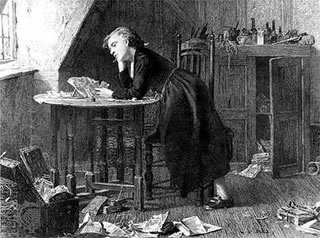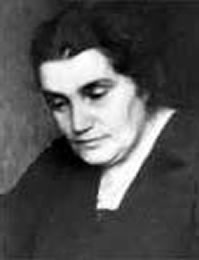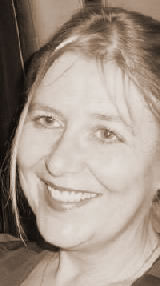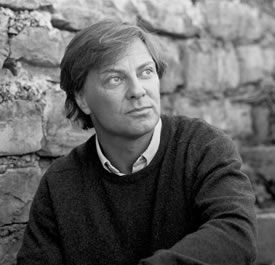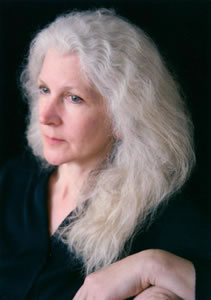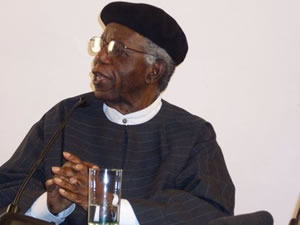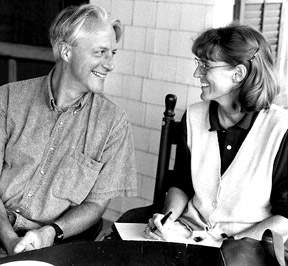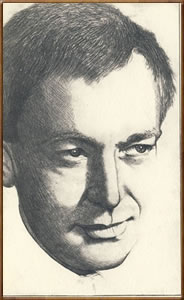De Duits-Roemeense dichter Paul Celan werd onder de naam Paul Antschel op 23 november 1920 geboren in Czernowitz, toentertijd de hoofdstad van de Roemeense Boekovina, nu behorend bij de Oekraïne. Zie ook mijn blog van 23 november 2006 en mijn blog van 29 maart 2006 en ook mijn blog van 23 november 2007 en ook mijn blog van 23 november 2008.
Todesfuge
Schwarze Milch der Frühe wir trinken sie abends
wir trinken sie mittags und morgens wir trinken sie nachts
wir trinken und trinken
wir schaufeln ein Grab in den Lüften da liegt man nicht eng
Ein Mann wohnt im Haus der spielt mit den Schlangen der
schreibt
der schreibt wenn es dunkelt nach Deutschland dein goldenes Haar
Margarete
er schreibt es und tritt vor das Haus und es blitzen die Sterne er
pfeift seine Rüden herbei
er pfeift seine Juden hervor lässt schaufeln ein Grab in der Erde
er befiehlt uns spielt auf nun zum Tanz
Schwarze Milch der Frühe wir trinken dich nachts
wir trinken dich morgens und mittags wir trinken dich abends
wir trinken und trinken
Ein Mann wohnt im Haus der spielt mit den Schlangen der
schreibt
der schreibt wenn es dunkelt nach Deutschland dein goldenes Haar
Margarete
Dein aschenes Haar Sulamith wir schaufeln ein Grab in den Lüften
da liegt man nicht eng
Er ruft stecht tiefer ins Erdreich ihr einen ihr andern singet und
spielt
er greift nach dem Eisen im Gurt er schwingts seine Augen sind
blau
stecht tiefer die Spaten ihr einen ihr andern spielt weiter zum Tanz
auf
Schwarze Milch der Frühe wir trinken dich nachts
wir trinken dich mittags und morgens wir trinken dich abends
wir trinken und trinken
ein Mann wohnt im Haus dein goldenes Haar Margarete
dein aschenes Haar Sulamith er spielt mit den Schlangen
Er ruft spielt süsser den Tod der Tod ist ein Meister aus
Deutschland
er ruft streicht dunkler die Geigen dann steigt ihr als Rauch in die
Luft
dann habt ihr ein Grab in den Wolken da liegt man nicht eng
Schwarze Milch der Frühe wir trinken dich nachts
wir trinken dich mittags der Tod ist ein Meister aus Deutschland
wir trinken dich abends und morgens wir trinken und trinken
der Tod ist ein Meister aus Deutschland sein Auge ist blau
er trifft dich mit bleierner Kugel er trifft dich genau
ein Mann wohnt im Haus dein goldenes Haar Maragrete
er hetzt seine Rüden auf uns er schenkt uns ein Grab in der Luft
er spielt mit den Schlangen und träumet der Tod ist ein Meister
aus Deutschland
dein goldenes Haar Margarete
dein aschenes Haar Sulamith
EINMAL
da hörte ich ihn,
da wusch er die Welt,
ungesehn, nachtlang,
wirklich.
Eins und Unendlich,
vernichtet,
ichten.
Licht war. Rettung.
Een oog, open
Uren, meikleurig, koel.
Wat niet meer te noemen is, heet,
hoorbaar in de mond.
Van niemand de stem, weer.
Kwellende oogappeldiepte:
het lid
staat niet in de weg, de wimper
telt niet, wat intreedt.
De traan, half,
de scherpere lens, beweegbaar,
zoekt je de beelden.
Vertaald door Frans Roumen

Paul Celan (23 november 1920 – 20 april 1970)
Celan op 17-jarige leeftijd
De Amerikaanse dichteres en schrijfster Jennifer Michael Hecht werd geboren op 23 november 1965 in New York. Zie ook mijn blog van 23 november 2006 en ook mijn blog van 23 november 2008.
Love Explained
Guy calls the doctor, says the wife’s
contractions are five minutes apart.
Doctor says, Is this her first child?
guy says, No, it’s her husband.
I promise to try to remember who
I am. Wife gets up on one elbow,
says, I wanted to get married.
It seemed a fulfillment of some
several things, a thing to be done.
Even the diamond ring was some
thing like a quest, a thing they
set you out to get and how insane
the quest is; how you have to turn
it every way before you can even
think to seek it; this metaphysical
refraining is in fact the quest. Who’d
have guessed? She sighs, I like
the predictability of two, I like
my pleasures fully expected,
when the expectation of them
grows patterned in its steady
surprise. I’ve got my sweet
and tumble pat. Here on earth,
I like to count upon a thing
like that. Thus explained
the woman in contractions
to her lover holding on
the telephone for the doctor
to recover from this strange
conversational turn. You say
you’re whom? It is a pleasure
to meet you. She rolls her
eyes, but he’d once asked her
Am I your first lover? and she’d
said, Could be. Your face looks
familiar. It’s the same type of
generative error. The grammar
of the spoken word wall flip, let alone
the written, until something new is
in us, and in our conversation.

Jennifer Michael Hecht (New York, 23 november 1965)
De Duitse dichter, schrijver en essayist Marcel Beyer werd op 23 november 1965 in Tailfingen / Württemberg geboren. Zie ook mijn blog van 23 november 2006 en ook mijn blog van 23 novem
ber 2008.
Junge Hunde
Ach, die Gutgebügelten, junge
Luden am Nebentisch, trinken
das Panzerpils und tauschen
Herrenheftchen. Einer wirft beim
Aufstehn die Flasche Bier um,
schmiert dann, nach und nach, ein
ganzes Paket Tempos über den
Plastiksitz. Kurzschnitte, und
Pomade. Totes Büffet. Im Jungsklo,
schöne Teile. Ein alter Glatzkopf
zupft sich etwas von den Lippen.
Humer-Bursche. Geschlipst. Gewienert.
Junge Hunde. Fickriges Blau. Im
Klappergang, Wien West, verschwitzte
Gürteltiere. Rauch schneller, Lude.
Ohneservice. Vielleicht Ein- bis
Zweihundert, in Randbezirken,
Arbeiterbeisln, Siebzehnter. Trotte
im Regen, aus einem offenen Fenster,
obere Etage, Dampf.
Im Hotel Orient
Wir sind gepuderte Gestalten
auf Polstern in der Sitzecke
halbdunkel, schwarzer Samtverschnitt.
Das sind die wahren Etablissements,
Männer im Unterhemd öffnen die Tür.
Ich bin jedoch nur Augen- / Ohrenkunde:
Gibt es das Räuspern noch? Das Schnupfen?
Das Verhören? „Die waren hungrig“, nachts,
im Nebenzimmer, spät bis Drei.
Und wir sind traurige Figuren
am Lacktisch, Nachtgespräch.
Augen, halboffen. Frisch rasierte Schläfen:
Gibt es das Flüstern noch? Das Rauchen?
Spiele die Koksnase: das mitgegangene
Tütchen Zucker, SANTORA, vor dem
kalkfleckigen Spiegel inhaliert.
MAXIM FUTUR-Spiegelung: Gibt es
das Schlucken noch? Und stehe da
wie aromatisiert: heiß, holundrisch
und schwach.

Marcel Beyer (Tailfingen, 23 november 1965)
De Turkse schrijver Sait Faik Abasıyanık werd geboren op 23 november 1906 in Adapazarı. Zie ook mijn blog van 23 november 2008.
Uit: Hisht, Hisht!… (Vertaald door Ufuk Özdağ)
“I WAS WALKING. The more I walked, the better I started to feel about things. I’d left home with so much anger piled up inside me. Maybe it was the razor blade that made me so angry. Oh yes, certainly. The razor blade! For sure, that’s what got me so mad.
The green of the grass, the blue of the sea, cloudless clear skies . . . Well these, mind you, are things to ponder, certainly. Who on Earth would deny this? Foolishness! What if it rained . . . what if the green grass was purple . . . what if the blue sea was red . . . If that were the case, that would be a thing to worry about, indeed.
I saw a leaf the color of chocolate, a goat the color of green almond. Someone, from behind, called out:
Hisht!
I turned around to check. The still not-so-tall fresh thistles at the edge of the road and the French lavender stared at me with a plum-tasting look. My teeth squeaked. There was no one on the road, not a single soul. I saw the roof of a house, one or two birds flying in the distance, the sea through the leaves. As I continued walking, I heard:
Hisht, hisht!
I wanted to turn around and look. Maybe because I wanted to so much I could not. Well, that could be it. Maybe a bird flew overhead, sounding hisht hisht. Maybe a snake, a tortoise, or a hedgehog passed from behind me. Perhaps there is a certain beetle, sounding like hisht hisht.
Hisht! it said again.
This time, perhaps out of unwillingness, I turned around and looked: I had a slight feeling that someone might be hiding in the bushes.
I knelt down at the edge of the sidewalk. A little in the distance, a donkey was grazing; it too had the color of green almond; its mouth, teeth, ears, neck . . . What a beauty. Grazing. Eating the grass with a sound like crunch crunch crunch. Could it be that I heard this crunch crunch sound as a hisht hisht? A sound quite different from the sound of a donkey biting off grass went:
Hisht hisht hisht!
It happens that sometimes, on your earlobe, a voice that you are very familiar with suddenly calls out your name. Isn’t that possible? Very rarely, though. Maybe it could be that, I thought, a voice that you love, that you remember, from inside your own head, calling out to you, voiceless. Quite a possibility.
All of a sudden a strange yellow fog, with no resemblance to a cloud, covered the sun. A dirty hand culled and pulled a cloth from the green almond back of a donkey. It dressed the donkey with the usual ash gray color, old threadbare overcoat. I stepped down to the road. Well, I said to myself, he may keep on saying “hisht” as much as he wants . . . whether he is a real, fun-loving friend, or whether there is no one around and it is me, my very self, a madman, whispering “hisht hisht” to my own ear . .„

Sait Faik Abasıyanık (23 november 1906 – 11 mei 1954)
Zie voor onderstaande schrijvers ook mijn blog van 23 november 2008.
De Bengaals-Indische schrijver Nirad C. Chaudhuri werd geboren op 23 november 1897 in Kishoreganj.
De Amerikaanse schrijver, vertaler, schilder, illustrator Guy Mattison Davenport werd geboren op 23 november 1927 in Anderson, South Carolina.
De Schotse schrijver en historicus Nigel Tranter werd geboren op 23 november 1909 in Glasgow.
De Duitse schrijfster Marieluise Fleißer werd geboren op 23 november 1901 in Ingolstadt.





















